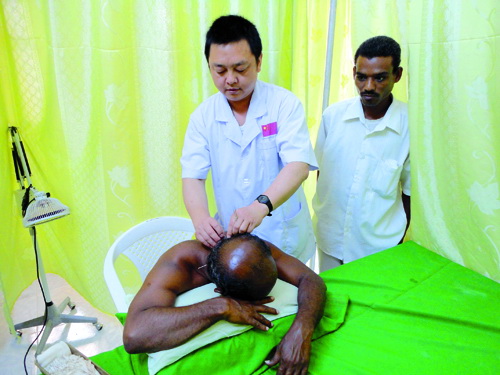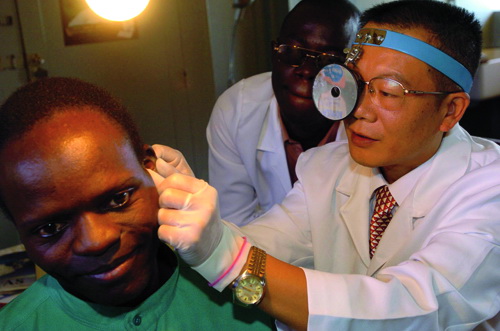|
 |
|
Chinese doctors treat African patients (COURTESY PHOTO) |
Before Chinese medical teams were sent to Africa, to most Africans, China was a remote country that they had barely heard of. But through seeing and being treated by Chinese doctors Africans began to learn about China and its people.
The current friendship between China and Africa is based in part on Chinese medical aid to the continent, which has been in place for 50 years. In the winter of 1962, the Chinese Ministry of Health (the predecessor of the National Health and Family Planning Commission) received a request from the Algerian Government through its embassy in Beijing, asking that Chinese medical professionals be sent to Algeria to help with local medical service development and education.
After Algeria's independence from French colonial rule, the French medical personnel that had staffed the country's hospitals and clinics left Algeria. At that time, the People's Republic of China was still young, struggling with poverty and other developmental problems. But despite the challenges, the Chinese Government made an announcement in January, 1963: Chinese medical teams would go to Algeria on long-term assignments.
Three months later, the first medical team set off after taking short training courses on medical techniques and foreign language skills. For most of the medical professionals involved, this was the first time that they had left their country to work. Excited and nervous, they said goodbye to their families and embarked on a journey that would give them a completely new working experience.
What was initially intended to be a half-year stay was extended three times to last a total of two and a half years. During their time in Africa, the medical team provided services to almost 400,000 patients, conducted 3,000 surgeries and delivered over 1,000 babies. There were no incidents of medical malpractice.
"There are 25 foreign medical teams working in Algeria,but you are the most welcomed," said the then Minister of Public Health of Algeria to the Chinese medical team. "You are our trustworthy brothers."
Building trust
Knowing little about China, many Africans at first had doubts about Chinese doctors' skills. So Chen Haifeng, a leader of the first medical team sent to Algeria in 1963, told his team members, "Kindness and willingness to help alone cannot establish us here. We must be useful and offer concrete help as well."
When Pan Jiangang arrived in Ghana at the end of 2011, he faced the same problem. "You must show them the effort that you make as a Chinese doctor. A small detail alone can change a patient's impression of us," said Pan.
He persuaded a female patient, who first insisted that she would only be seen by Ghanaian doctors, to finally give him a chance. She told him that her incisions from an earlier surgery had not healed in the three months since the operation. Pan soon had a diagnosis: the woman suffered from diabetes, and this was keeping her from healing. He managed to get her blood-sugar levels under control.
The woman was also astonished by the fact that Pan personally changed her dressing, a task that, in Ghana, is typically only performed by nurses. Pan was the first doctor who was willing to treat her in this way. When the woman was cured four weeks later, she gave Pan a Bible as gift, saying that she thanked God for letting her meet a kind Chinese doctor. "I don't know much about Christianity or the Bible, but I will always cherish it," said Pan.
 |
|
Chinese doctors treat African patients (COURTESY PHOTO) |
Once misunderstandings were ironed out, Africans put a great deal of trust in Chinese doctors. "When they got a disease, no matter what it was, they would come to us for help," recalled Xu Zhenggang, a retired doctor who specialized in gastroenterology, about his experience in Guinea in the 1960s.
"We could feel their pain and anxiety, and this pushed us to learn more," said Xu. "As a result, we all effectively became general practitioners and worked to treat many different kinds of diseases."
According to Xu, many young parents named their newborns Chinois (the French word for "Chinese") to express their gratitude.
Chinese treatment
"I don't think we are obligated to do something really great," said Pan. "Our main task is to communicate with local doctors and teach them our medical theories and techniques."
When Wang Dengqi, a doctor from Guangxi University of Chinese Medicine, arrived in Niger in 1976, he brought his background in traditional Chinese acupuncture treatment with him. His first patient was a farmer who couldn't believe that silver needles were able to treat his illness. But when the needles eased the pain that had plagued him for over five years, the farmer could not wait to share his incredible story with others. Soon after, more and more patients came to try acupuncture treatment.
"I have treated as many as 140 patients on my busiest days," said Wang. "My patients ranged from presidential counselors to common people."
Given the effectiveness of acupuncture, Niger's Ministry of Public Health asked if Chinese doctors could provide a course on acupuncture treatment to local doctors. After six months, 20 doctors and nurses graduated from the training course. Armed with basic acupuncture skills, they began to treat their people by using Chinese techniques.
"Needles are medical tools, but they can also build ties of friendship," said Wang.
Email us at: zhengyang@chinafrica.cn |